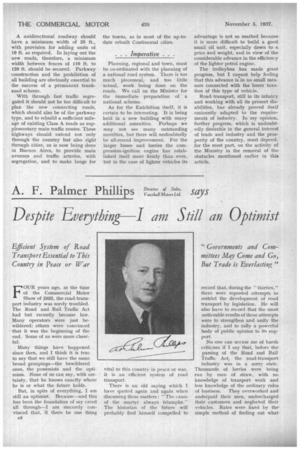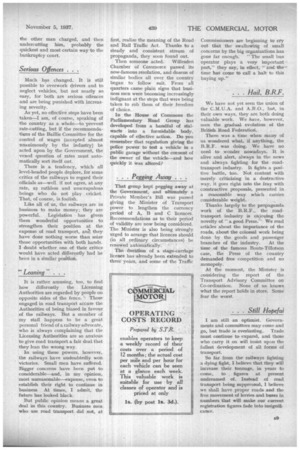A. F. Palmer Phillips
Page 16

Page 17

If you've noticed an error in this article please click here to report it so we can fix it.
Despite Everything I am Still an Optimist
FOUR years ago, at the time of the Commercial Motor Show of 1933, the road-transport industry was sorely troubled. The Road and Rail Traffic Act had but recently become law. Many operators were just be
wildered; others were convinced that it was the beginning of the end. Some of us were more cheerful.
Many things have happened since then, and I think it is true to say that we still have the same broad groupings—the bewildered ones, the pessimists and the optimists. None of us can say, with certainty, that he knows exactly where he is or what the future holds.
But, in spite of everything. I am still an optimist. Because—and this has been the foundation of my creed all through—I am sincerely convinced that, if there be one thing vital to this country in peace or war, it is an efficient system of road transport.
There is an old saying which have quoted again and again when discussing these matters : " The cause of the martyr always triumphs." The historian of the future will probably find himself compelled to
record that, during the " thirties," there were repeated attempts to restrict the development of road transport by legislation. He will also have to record that the most noticeable results of those attempts were to strengthen and unify the industry, and to rally a powerful body of public opinion to its support.
No one can accuse me of harsh criticism if I say that, before the passing of the Road and Rail Traffic Act, the road-transport industry was in a sorry state. Thousands of lorries were being run by men of straw, with no knowledge of transport Work and less knowledge of the ordinary rules of business. They overworked and underpaid their men, undercharged their customers and neglected their vehicles. Rates were fixed by the simple method of finding out what the other man charged, and then undercutting him, probably the quickest and most certain way to the bankruptcy court.
Serious Offences . . .
Much has changed. It is still possible to overwork drivers and to neglect vehicles, but not nearly so easy, for both are serious offences and are being punished with increasing severity.
As yet, no effective steps have been taken—I am, of course, speaking of the country as a whole—to prevent rate-cutting, but if the recommendations of the Baillie Committee for the control of wages (accepted almost unanimously by the industry) be acted upon by the Government, the vexed question of rates must automatically sort itself out.
There is a tendency, which all• level-headed people deplore, for some critics of the railways to regard their officials as—well, if not ogres, at any rate, as ruthless and unscrupulous beings who do not play cricket. That, of course, is foolish.
Like all of us, the railways are in business to make money; they are powerful. Legislation has given them wonderful opportunities to strengthen their position at the expense of road transport, an they have done nothing worse than seize those opportunities with both hands. I doubt whether one of their critics would have a.cted differently had he been in a similar position.
"Leaning
It is rather amusing, too, to find how differently the Licensing Authorities are regarded by people on opposite sides of the fence. • Those engaged in road transport accuse the Authorities of being biased in favour of the railways. But a member of my staff happens to be a great personal friend of a railway advocate, who is always complaining that the Licensing Authorities are so anxious to give road transport a fair deal that they lean the wrong way.
In using these powers, however, the railways have undoubtedly won victories. Small men have suffered. Bigger concerns have been put to considerable—and, in my opinion, most unreasonable—expense, even to establish their right to continue in business At times, I admit, the future has looked black.
But public opinion means a great deal in this country. Business men who use road transport did not, at first, realize the meaning of .the Road and Rail Traffic Act. Thanks to a steady and consistent stream of propaganda, they soon found out.
Then someone acted. Willesden Chamber of Commerce passed its now-famous resolution, and dozens of similar bodies all over the country began to follow suit. From all quarters came plain signs that business men were becoming increasingly indignant at the steps that were being taken to rob them of their freedom of choice.
In the House of Commons the Parliamentary Road Group has developed from a handful of stalwarts into a formidable body, capable of effective action. De you remember that regulation giving the police power to test a vehicle in a public garage without the consent of the owner of the vehicle—and how quickly it was altered?
. . . Pegging Away That group kept pegging away at the Government, and ultimately a Private Member's Bill was passed giving the Minister of Transport power to lengthen the currency period of A, B and C licences. Recommendations as to their period of validity are now being considered. The Minister is also being strongly urged to arrange that licences should (in all ordinary circumstances) be renewed a,utOmatically.
The duration of a stage-carriage licence has already been extended to three years, and some of the Traffic
Commissioners are beginning to cry out that the swalloviing of small concerns by the big organizations has gone far enough. "The small bus operator plays a very important part," they say, in effect, " and,tter' time has come to call a halt to this buying up."
. . Hail, B.R.F.
We have not yet seen the union of the C.M.U.A. and A.R.O., but, in their own ways, they are both doing valuable work. We have, however, seen the gradual evolution of the British Road Federation. .
There was a time when many of us wondered what, if anything, the B.R.F. was doing. We have no need to wonder nowadays. It is alive and alert, always in the news and always fighting for the roadtransport industry. It fights a positive battle, too. Not content with merely criticizing in a destructive way, it goes right into the fray with constructive proposals, presented in a reasonable way which carries considerable weight.
Thanks largely to the propaganda work of the B.R.F., the roadtransport industry is enjoying the novelty of "a good Press." We read articles about the importance of the roads, about the colossal work being done by the goods and passenger branches of the industry. At the time of the famous Bouts-Tillotson case, the Press of the country demanded free competition and no monopoly.
At the moment, the Minister is considering the report of the Transport Advisory Committee on Co-ordination. None of us knows what the report holds in store. Some fear the worst.
. Still Hopeful
I am still an optimist. Governments and committees may come and go, but trade is everlasting. Trade must continue to expand, and those who carry it on will insist upon the fullest development of all forms of transport.
So far from the railways fighting a dying fight, I believe that they will increase their tonnage, in years to . come, to figures at present undreamed of Instead of road transport being suppressed, I believe we shall have proper roads and the free movement of lorries and buses in numbers that will make our current registration figures fade into insignificance.


















































































